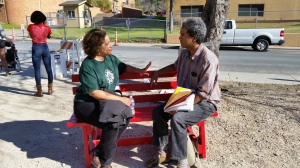What is compassion?
“Among emotion researchers, it is defined as the feeling that arises when you are confronted with another’s suffering and feel motivated to relieve that suffering.” (University of California at Berkeley, the Greater Good Science Center)
What is “3D” Compassion? It is important to recognize the 3-dimensional (3D) scope of compassion: caring for others, self, and the Earth. All 3 dimensions are important to complete the whole.
Compassion skills include: awareness, mindfulness, critical thinking, empathy, gratitude, awe, connection, forgiveness, kindness, happiness, optimism, resilience to stress.
Practice is essential to strengthen compassion skills and habits.
Why is compassion important?
“3D” compassion is essential to our current well-being and to the well-being of future generations. Compassion is about the way we choose to live and survive. It requires us to live in ways that enable all to thrive.
Compassion is what motivates people to identify and address personal, community, and global needs. Compassion is a common, unifying force for social good!
Compassionate Austin
Austin City Council Resolution designating Austin as a Compassionate City
Compassionate Austin Hallmarks
Vision: Austin exemplifies and champions compassion, creating a livable, vibrant, inclusive, and caring community in which ALL may thrive.
Mission: Everyone in Austin will become aware and conscious of the significance of compassion (caring for others, self, and the Earth) and will strengthen compassion skills, practice, action, and accountability to meet needs.
Strategy: Through the Compassionate Austin movement we will highlight and support each other, broaden our compassion awareness and intention, collaborate, forge new relationships, strengthen compassion skills and activities to identify and meet community needs, and increase engagement of people throughout Austin and vicinity in compassionate action.
Tenets: We adhere to the tenets of the “Golden Rule” as put forth in the Charter for Compassion and encourage people to affirm the Charter to make a personal commitment to compassionate action.
Core Values: Compassionate Austin has an inherent set of core values expressed in the Charter for Compassion and in the Austin City Council Resolution designating Austin as a Compassionate City. In recognition of Leadership Austin‘s example for our community, Compassionate Austin also affirms and supports the values stated on the Leadership Austin website.
The Charter for Compassion
The Charter calls us to live by a universal code based on the Golden Rule: Never do to others what you would not want done to yourself. The Charter was created as a result the acclaimed research of Dr. Karen Armstrong who was awarded the TED prize in 2008.
Compassionate Communities Campaign
Compassionate Austin is part of the Charter for Compassion’s Compassionate Communities campaign. There are hundreds of compassionate communities initiatives globally and the number is growing. In cities and communities around the world, people are engaged in community compassionate action to address hunger, homelessness, healthcare, restorative justice, education efforts, bullying, the environment, etc.
In Texas, other compassionate cities include San Antonio, Houston, and Dallas/Fort Worth.
Connect with Compassionate Austin!
Join us on Facebook: Like our page: https://www.facebook.com/compassionateaustin and join our Facebook Group: https://www.facebook.com/groups/compassionateaustin/
Email: compassionateaustin@gmail.com
Do you want to VOLUNTEER? Send an email to compassionateaustin@gmail.com if you are interested.



Pingback: Lesa R. Walker: What Makes a Compassionate City? – Excellence Reporter